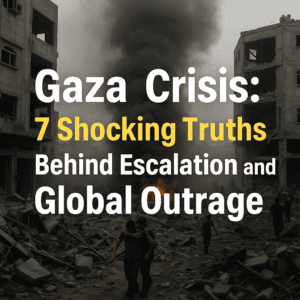Gaza Crisis: 7 Shocking Truths Behind Escalation and Global Outrage
Israeli airstrikes in Gaza have killed over 140 Palestinians in 24 hours, escalating a months-long conflict that has now claimed more than 53,000 lives. The UN human rights chief condemned the bombardment as “ethnic cleansing,” accusing Israel of deliberately displacing civilians through intensified attacks and aid blockades, while hospitals report catastrophic conditions. Israel defends the offensive as part of “Operation Gideon’s Chariot,” aimed at dismantling Hamas and securing hostages, though troop buildups suggest plans for prolonged control.
A near-total Israeli blockade since March has pushed Gaza toward famine, with malnutrition soaring and aid groups rejecting Israel’s proposal to privatize aid distribution. International outcry grows, with Arab states pledging $40 million for reconstruction and Spain urging a UN resolution to enforce aid access. Ceasefire talks resumed in Qatar, though prospects remain dim as Israel’s security cabinet weighs seizing Gaza entirely. Meanwhile, global leaders warn the offensive risks worsening civilian suffering and endangering hostages, underscoring the urgent need for diplomacy to halt one of this century’s gravest humanitarian crises.

Gaza Crisis: 7 Shocking Truths Behind Escalation and Global Outrage
The conflict in Gaza has reached a devastating crescendo, with over 140 Palestinians killed in the past 24 hours and more than 300 deaths reported since Thursday, according to Palestinian health officials. This surge marks one of the deadliest phases since ceasefire negotiations collapsed in March. Hospitals, such as the Indonesian hospital in northern Gaza, face catastrophic conditions, with victims trapped under rubble and overwhelmed medical staff struggling to cope.
International Condemnation and Accusations
UN Human Rights Chief Volker Türk has accused Israel of actions “tantamount to ethnic cleansing,” citing intensified bombings and aid blockades that risk permanent demographic displacement. UN Secretary-General António Guterres echoed calls for an immediate ceasefire during an Arab League summit, where ministers pledged $40 million for Gaza’s reconstruction—a stark contrast to former U.S. President Donald Trump’s controversial suggestion to transform Gaza into a U.S.-controlled “freedom zone.”
Israel’s Military Objectives
Israel attributes the escalation to “Operation Gideon’s Chariots,” a campaign aimed at achieving “all war goals,” including dismantling Hamas and securing the release of 57 remaining hostages from the October 2023 attacks, which killed 1,200 Israelis. Troop buildups along Gaza’s borders signal plans for extended operational control. However, the strategy faces scrutiny as civilian casualties mount, surpassing 53,000 Palestinian lives lost since the war began.
Humanitarian Crisis Deepens
A near-total Israeli blockade since March 2 has precipitated famine conditions, with malnutrition rates soaring among children. The UN warns of “rigorous mechanisms” to ensure aid reaches civilians, rejecting Israel’s proposal to distribute supplies via private contractors guarded by troops. Aid groups argue the plan risks forced displacement and undermines existing UN infrastructure.
Diplomatic Moves and Global Response
Ceasefire talks resumed in Doha, with Hamas official Taher al-Nono stating discussions are ongoing “without pre-conditions.” Meanwhile, Spain seeks a UN resolution to compel International Court of Justice intervention on aid access. European leaders, including Germany and Spain, have condemned the offensive, emphasizing risks to hostages and regional stability.
Contextual Balance
While Israel asserts its actions target Hamas, the disproportionate toll on civilians—amplified by strikes on hospitals and aid delays—fuels allegations of collective punishment. Hamas’ role in initiating the conflict and its governance failures are critical context, though recent military tactics dominate global discourse.
Conclusion
The Gaza conflict remains a volatile intersection of military strategy, humanitarian law, and geopolitics. As international bodies grapple with accusations of ethnic cleansing and war crimes, the path to ceasefire appears fraught. The world watches whether diplomatic efforts can curb the bloodshed or if further escalation will deepen one of this century’s most devastating humanitarian crises.
The crisis underscores the urgent need for multilateral diplomacy that prioritizes civilian protection and addresses root causes, including Hamas’ governance and Israel’s security concerns. Without renewed commitment to dialogue, cycles of violence risk perpetuating indefinitely.
You must be logged in to post a comment.